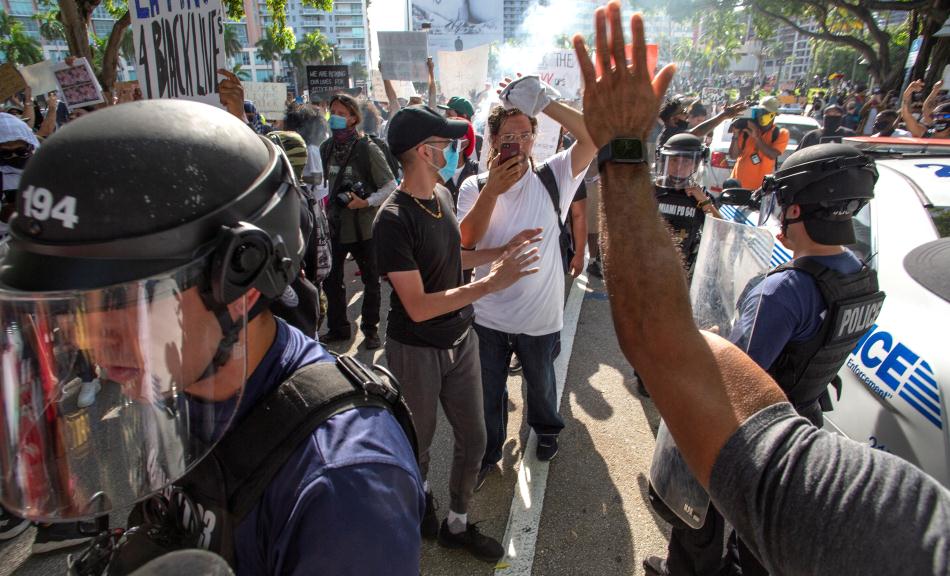
Spanish – Multiple protesters arrested in Miami and other U.S. cities have told the FBI they received money from activists in Cuba and Venezuela, several sources told Venezuelan journalist Casto Ocando. This could mean that the Bolivarian breezes that Nicolás Maduro announced in October when Chile, Ecuador, Colombia, and Bolivia (in November) were faced with a wave of destabilizing protests are also blowing to the north.
“There are definitely individuals associated with Venezuela who paid for people to travel to various cities in the United States to promote chaos,” an informant told Primer Informe.
The source claims that the detainees include citizens of Haiti, Venezuela, Honduras, and the United States who were interrogated by FBI domestic counterterrorism agents.
The money was transferred Friday and Saturday, May 30, to Downtown Miami, where several of the detainees are residents, specifically in the area known as Little Haiti, according to the source.
This is a flagrant offense in at least two of the cases because they were arrested with significant amounts of cash.
While local authorities, such as the Miami District Attorney’s Office, are in charge of investigations, intelligence officials are reportedly looking to establish links with Venezuela and Cuba.
Here's my video of the peaceful protest that escalated into cars on fire, tear gas being deployed and looting in Downtown Miami tonight. pic.twitter.com/a1zUUzDI3x
— Joel Franco (@OfficialJoelF) May 31, 2020
Bolivian police arrest Cubans accused of financing protests
The same happened in Bolivia on November 13 when four Cubans were arrested with cash to finance the protests against the government of Jeanine Añez. They were members of the Cuban Medical Brigade, but only one of the four detainees was identified as a doctor: Ramon Emilio. Although Amparo Lourdes is an electro-medical engineer, he is not a medical doctor, nor is the man who held the backpack with the equivalent of 13 thousand dollars in Bolivian pesos, Idalberto Delgado. Although neither of them practices the medical profession, both were selected as outstanding workers of the medical mission in La Paz in 2018.
According to the detainees, that money was taken from the Union Bank to pay the Cuban doctors. But neighbors in the area accused them of paying the demonstrators. The arrest took place precisely in the area of the greatest concentration of protests around the Plaza Murillo in La Paz, where the Metropolitan Cathedral, the Government Palace, and the National Congress are located.
Hoy nuestra Policía capturo a un guerrillero Cubano y otros extrangeros repartiendo dinero a los delincuentes que…
Posted by Bella Bolivia on Wednesday, November 13, 2019
By mid-November, Chile had already expelled 50 foreigners “for engaging in looting, being involved in disorder, attempting to undermine authority, and setting up barricades.” This included 30 Cubans, nine Venezuelans, and one Bolivian.
A month later, on the morning of Friday, December 13, Chile expelled 56 foreigners, who were staying illegally in the country, 12 of them accused of having participated in the looting and vandalism, that attacked the economy during the demonstrations “against the system” that began on October 18.
In response, the then U.S. special representative for the crisis in Venezuela, Elliott Abrams, said, “there is evidence beginning to build of an effort by the regimes in Cuba and Venezuela to exacerbate problems in South America.”
“Our local left doesn’t have that capacity,” argued René Barba, councilman from the municipality of Lo Barnechea in the Chilean capital, during his visit to Miami, USA, where he is seeking support to fight the advancement of the socialist project in the region.
For Barba, the violence in Chile “only leads one to think that here is the hand of Castro-Chavismo. They are perhaps seeking prosperity,” because the Castro and Maduro regimes, he said, “need resources and our country has witnessed development that we are not seeing anymore. In other words, “they want to milk the cow.”
At the time, the OAS said the following:
The recent currents of destabilization of the political systems of the hemisphere have their origins in the strategy of the Bolivarian and Cuban dictatorships, which seek to reposition themselves once again, not through a process of re-institutionalization and re-democratization, but through their old methodology of exporting polarization and bad practices, to essentially finance, support and promote political and social conflict.
The OAS’ statement was prompted by Diosdado Cabello’s closing remarks at a United Socialist Party of Venezuela (PSUV) demonstration. Cabello, who is the Maduro regime second-in-command, said, “what is happening in Peru, Chile, Argentina, Honduras, Ecuador, is just the breeze. The Bolivarian hurricane is on its way. We are not isolated in the world. On the contrary, Venezuela is more consolidated every day.”
If the role of Cuban and Venezuelan intelligence is proven, what the OAS has said (“Bolivarian breezes are not welcome in this hemisphere”) now also includes the United States.
 Versión Español
Versión Español













